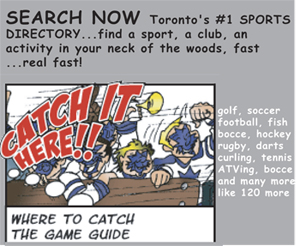The Maple Leafs Are Promoting Hockey in Toronto
August 30, 2009
by Tommy G…  It’s been 25 years since a new public ice facility has been built in the Toronto area. That’s going to change this September during the grand opening of the MasterCard Centre for Hockey Excellence.
It’s been 25 years since a new public ice facility has been built in the Toronto area. That’s going to change this September during the grand opening of the MasterCard Centre for Hockey Excellence.
The Centre will replace the Lakeshore Lions Arena, which was built in 1951, and it will continue to be operated by the Lakeshore Lions Club.
The MasterCard Centre is a shared initiative between MLSE, MasterCard, and the Lakeshore Lions Club. It is a state-of-the-art building with three NHL size ice-pads and one Olympic size pad.
The building will be open to the public, but it will also be used for Maple Leafs and Marlies practices. On top of that, it will be home to Hockey Canada’s Ontario Regional Offices and the Hockey Hall of Fame’s archives and research facilities.
This is an excellent opportunity to promote hockey in Toronto where basketball and soccer have stolen a huge chunk of the market.
The Maple Leafs are finally realizing that their influence in Toronto is losing potency. Hockey must learn to share with other sports and entertainment and fight for its position.
The Leafs will also be going from a $400,000 community investment, in the past three years, to $2.3 million in the next five years.
The money will be used to refurbish outdoor, city owned rinks. Brian Burke didn’t lie when he said that the Maple Leafs will increase their community influence in Toronto.
The Maple Leafs want to give every youth in the city a chance to develop their love for hockey. MLSE has had a revelation that, through community involvement, Toronto can truly become the hockey mecca and not just in name.
MLSE’s recent hockey related investments make me believe that they want to create a “hockey factory” in the Toronto area. The Leafs want potential players that will stay loyal to the team and/or city that fostered their development.
This is a fantastic outreach program, and creating a facility where the grassroots community can skate and play hockey, on the same surface as the Maple Leafs, is an excellent marketing plan.
Not only does it promote hockey development, but it also brings NHL players closer to the public. The accessibility to players and hockey archives allows people to study the game and mesh with the NHL community.
Suddenly, players become human in our minds and a new generation of hockey fans may develop from MLSE’s public participation.
Are Most Toronto Maple Leafs Fans a Bunch of Knuckleheads?
August 25, 2009
by Tommy G… I’m finally convinced that fans of the Toronto Maple Leafs don’t want a Stanley Cup. They just want “Mats Sundin” surrounded by mediocrity for another 13 years.
Following the draft and free agency period many Maple Leafs fans continued to do something that drives me nuts. They called into local sport radio stations to share their asinine opinions that can be described as fantastical at best.
This time they suggested that Brian Burke acquired too many goons and checkers. “We already have a team full of third- and fourth-line checkers,” they cried from the roof tops.
It sounds like these fans don’t want a winning team and would prefer an overpaid superstar or maybe a whiny baby like Dany Heatley.
As usual, I disagree but I also don’t take this breed of Leafs fan seriously. Frankly, I don’t think that they know enough about hockey to conjure up an educated comment (oops, was I supposed to say that out loud?)
Not all players with minimal stats are great checkers for the third and fourth line. So, I’m kind of tired of people who say that the Leafs are full of third and fourth liners. Checking forwards have an intangible skill and role to play and not just anyone can fill it. Can you honestly suggest that Tim Stapleton is a better third liner than Colin Stuart or Wayne Primeau? I don’t think so.
What the Leafs have on their team now is not a bunch of checkers but rather many players that want to compete for a spot on the top two lines. These types of players are not satisfied with the limited role of a checker, nor do they possess the skills necessary for this kind of player.
Not every top-six forward is an all-around great player like Pavel Datsyuk or Henrik Zetterberg.
Yes, the Maple Leafs need a legitimate first line with at least two A-list players but above all they require better defensive players.
Scoring is essential but the Leafs were actually decent in that department. They had five 20-goal scorers if you include Nik Antropov. Isn’t that better than two 30-40 goal scorers surrounded by mediocrity?
The Leafs’ problems actually came in their own zone where they possessed some of the worst defensive and goaltending stats in the NHL.
In relation, I also refuse to blame Vesa Toskala for all the defensive woes that plagued the Maple Leafs last season. I agree that he let in a lot of soft goals but most goalies are only as good as their team’s defensive prowess.
As a result, Burke had to prioritize by building the Leafs from the net out. He simply filled the biggest holes that his team possessed and offense was not on top of his list.
Why not?
Who’s to say that Mikhail Grabovski won’t become that 30-40-goal scorer this season? But then again, it’s only Grabovski, right? I mean to most Leaf fans he still wouldn’t be considered a superstar.
That’s just ridiculous. Even Datsyuk and Zetterberg were once in the same position before they took that extra step.
Unfortunately, patience is not everyone’s virtue, but Leafs Nation must realize that Burke’s task is not easy. He can’t erase 42 years of mismanagement and self entitlement.
Leaf fans have waited long enough but Burke has just arrived. He hasn’t been at the helm since 1967. What happened before is not his problem and he can’t shoulder the impatience of his team’s supporters.
He can only start fresh and help ensure that the next 42 years won’t be as disappointing.
In essence, he is doing what everyone “seemed” to want: build a perennial winner at a smart and steady pace.
Part of that process is also working with what you have because, in today’s NHL, trading for star power may not always be the key to winning.
The Detroit Red Wings didn’t go out and buy Henrik Zetterberg or Pavel Datsyuk. They developed and groomed them for the job. The team fosters development and a great working environment. They work with what they have and they are loyal to their players.
On any other team these two athletes may not have developed into present-day superior hockey players.
Brian isn’t trading away any draft picks or young talent like Luke Schenn. He’s trying to be as honest as possible to his colleagues and that’s a good trait for any organization.
Tomas Kaberle: Deal or No Deal?
August 4, 2009
by Tommy G… “Unless we’re blown away” has become the phrase of choice in Toronto. Whatever happened to “no comment,” “that’s none of your business,” or “that’s for you to find out and me to know”?
What’s the point of having reporters anymore? Sports franchises are spewing it all out in the open. They might as well directly call in every thought they have to their local media entities.
Do reporters actually have to do their jobs anymore, besides holding a recording device? Do they even need any sources?
Obviously, I’m referring to Toronto general managers Brian Burke and J.P. Ricciardi. More specifically, I’m focusing on Burke and his belligerent Toronto Maple Leafs.
Burke has a habit of interacting with the media and unveiling too much of his thoughts and plans.
It’s not a secret that Tomas Kaberle was on the trade block. The Leafs began their rebuilding process by not re-signing Mats Sundin, they bought out Darcy Tucker, and then they traded Bryan McCabe.
Plus, nearly a month ago, Burke managed to dump Pavel Kubina’s rich contract after a decent, 14 goal season.
After all this maneuvering there’s no wonder why fans and the media would assume that Kaberle may be next on that list. But Burke and the organization didn’t have to add fuel to that rumour by confirming these intentions.
What happened to denial?
Now that he has improved the Leafs’ defense, Burke realizes that Kaberle could be a valuable part of the team. All of sudden Kaberle isn’t a trade-able commodity for the Maple Leafs.
This reminds me about the “I want Tavares” debacle leading up to the draft. If he wanted Tavares, then he should have kept his mouth shut.
But not Burke. That’s too logical and easy for him. He has to spew his objectives out to the media. Then when he can’t get it done or he changes his mind, he looks like a buffoon.
Why does Burke go about doing his business in this manner? Does he want to create a culture of insecurity in the Leafs locker room?
After all, he did say that players have to prove their worth. He doesn’t want a country club atmosphere with any sense of entitlement.
If that’s the case, then Burke has accomplished his goal. But at what cost?
To me, he seems like a rational person who isn’t afraid to change his mind if it benefits the team. It’s good that he realized that Kaberle is now a benefit. Another general manager may have traded him anyway and maybe for peanuts too.
I give him praise for this move or lack thereof.
However, to many other people Burke can come across as an indecisive general manager who doesn’t know how to manage.
This state of mind could simply disappear if he became inconspicuous and less revealing. If the media and fans don’t know what you’re planning then they can’t possibly be disappointed if a deal doesn’t workout or if you do an about-turn.
Burke has to realize that Toronto takes its sports trades seriously and fans and media are hungry for star power. Perhaps—at the risk of being verbally lambasted—even more than championships.
Either way, Burke’s mind is an anomaly in my opinion. But he’s doing it “his way or the highway” and that’s more than I can say about most Leafs managers in the past. And I respect that.



Recent Comments